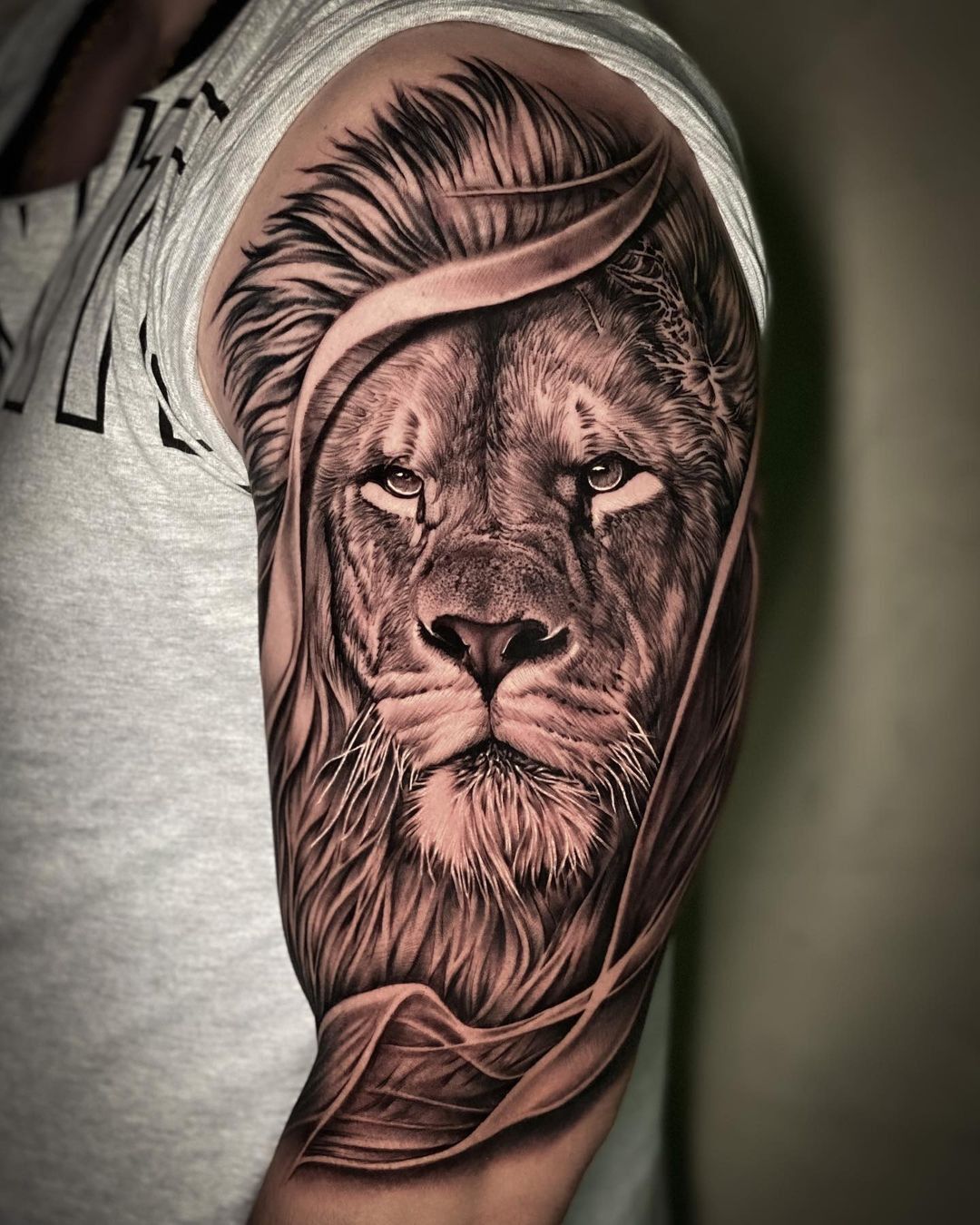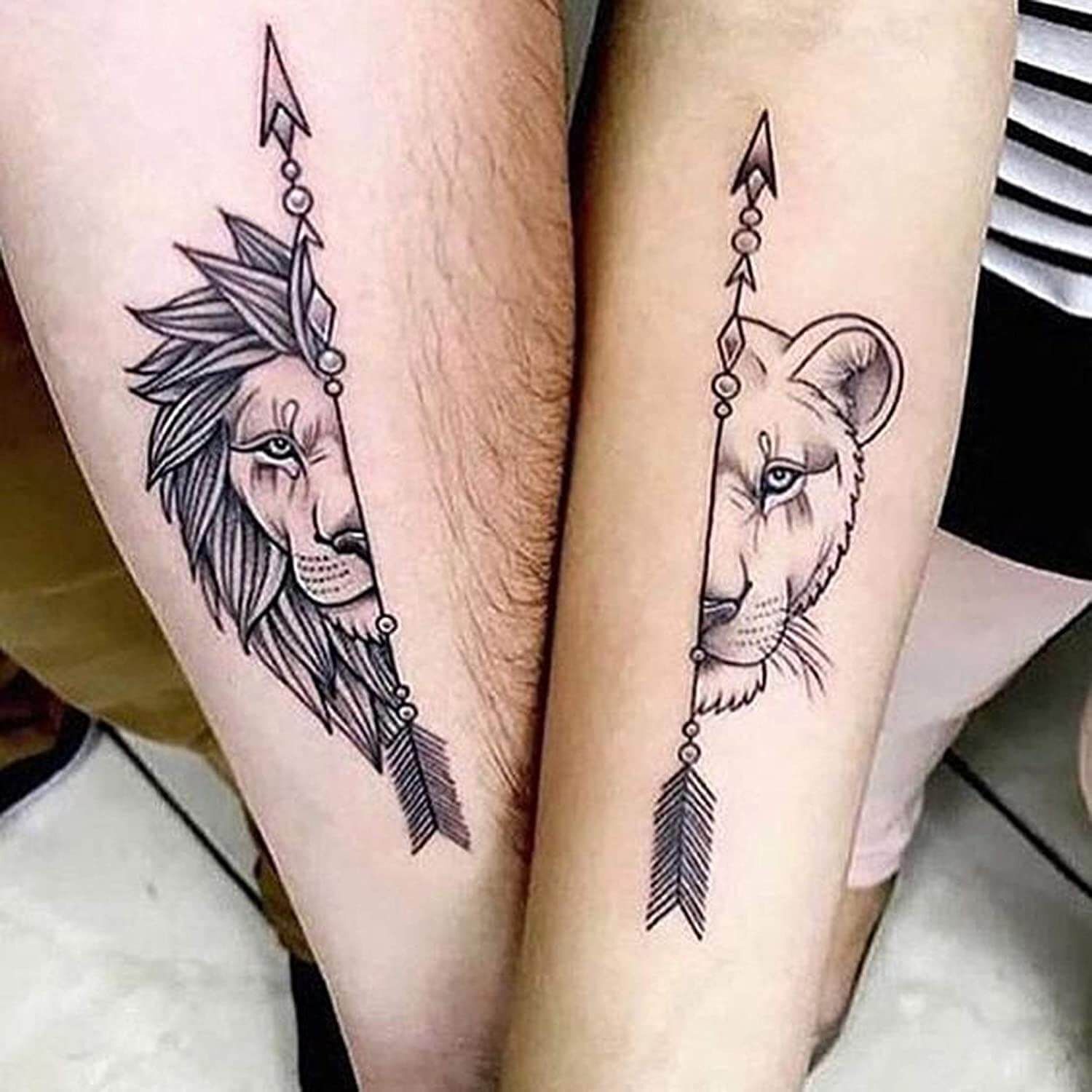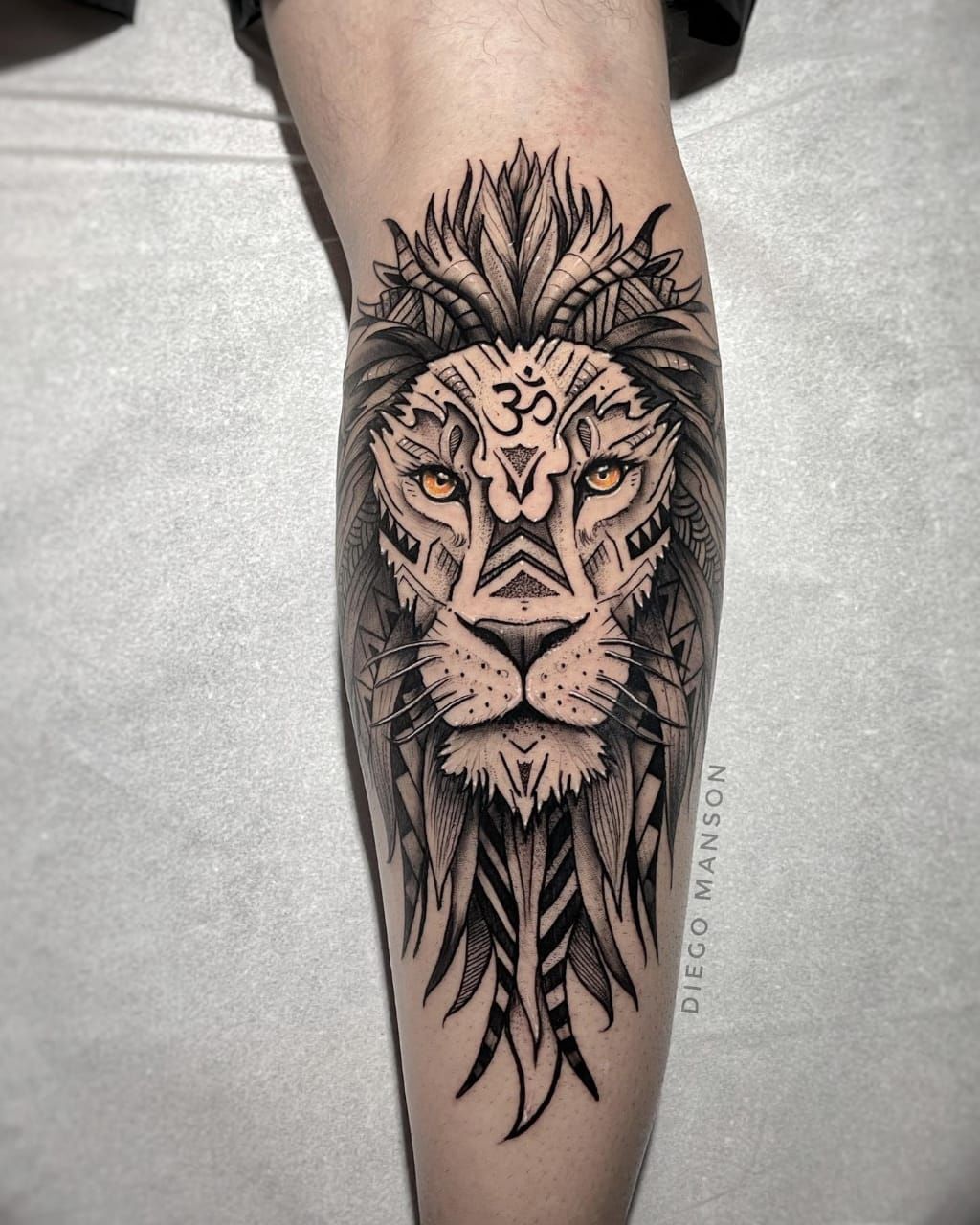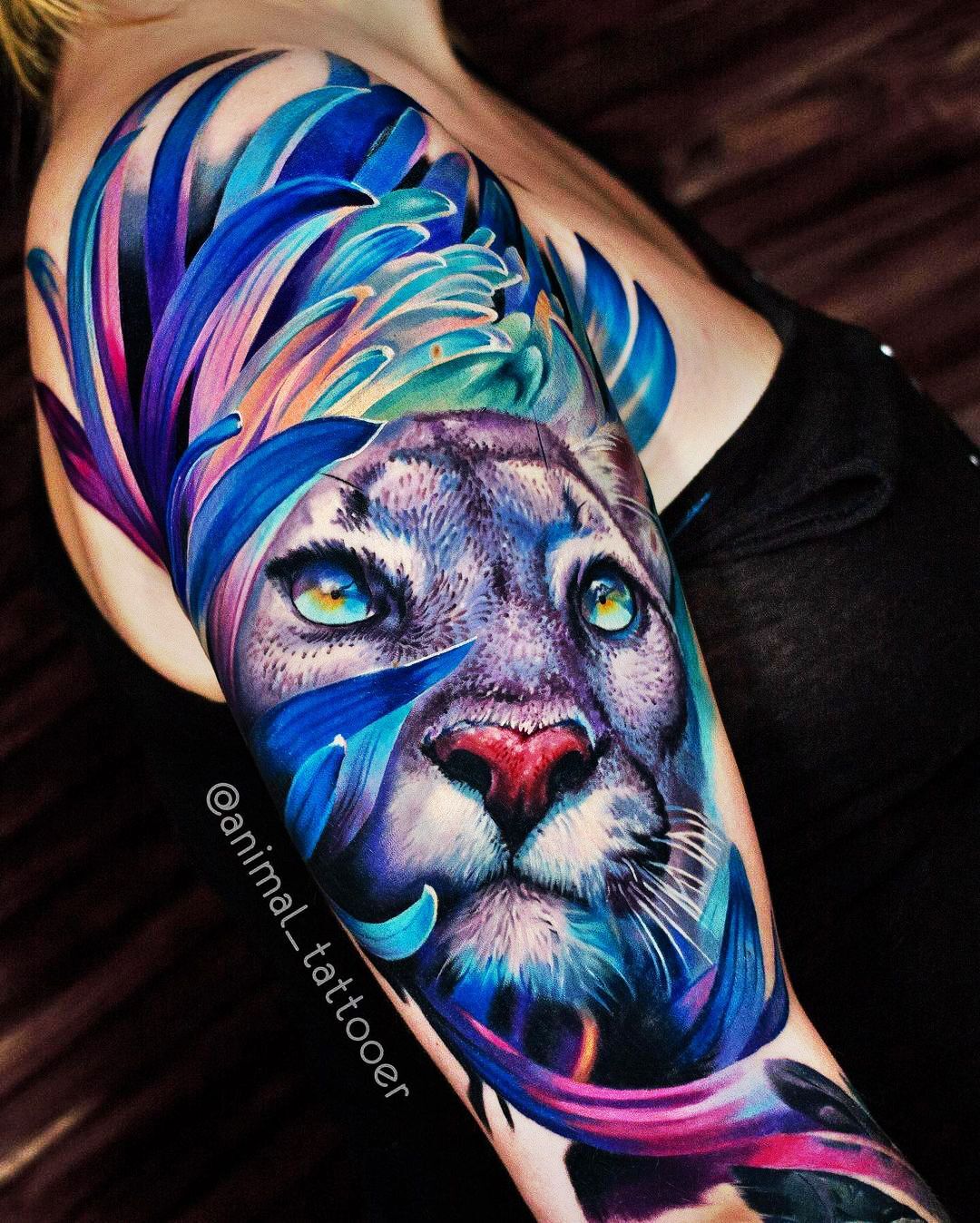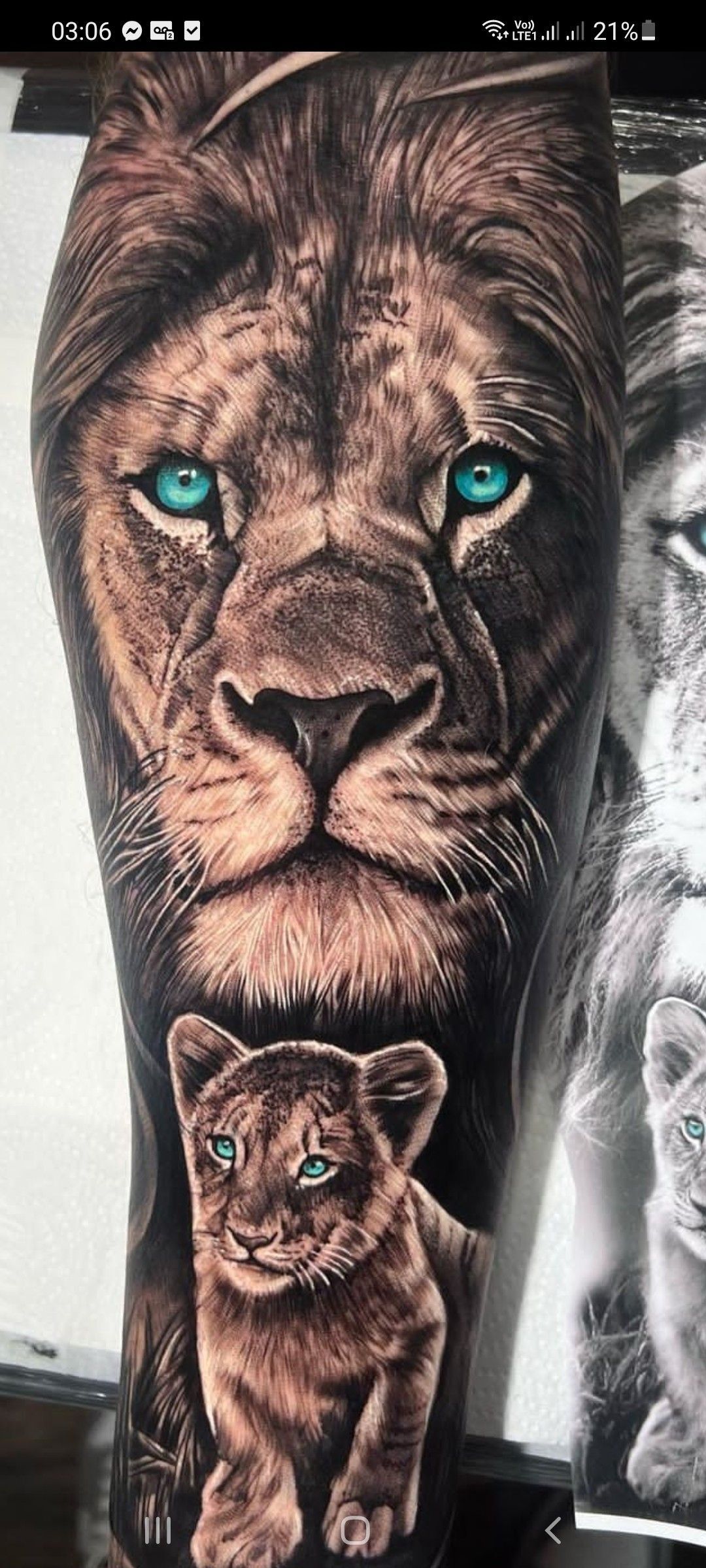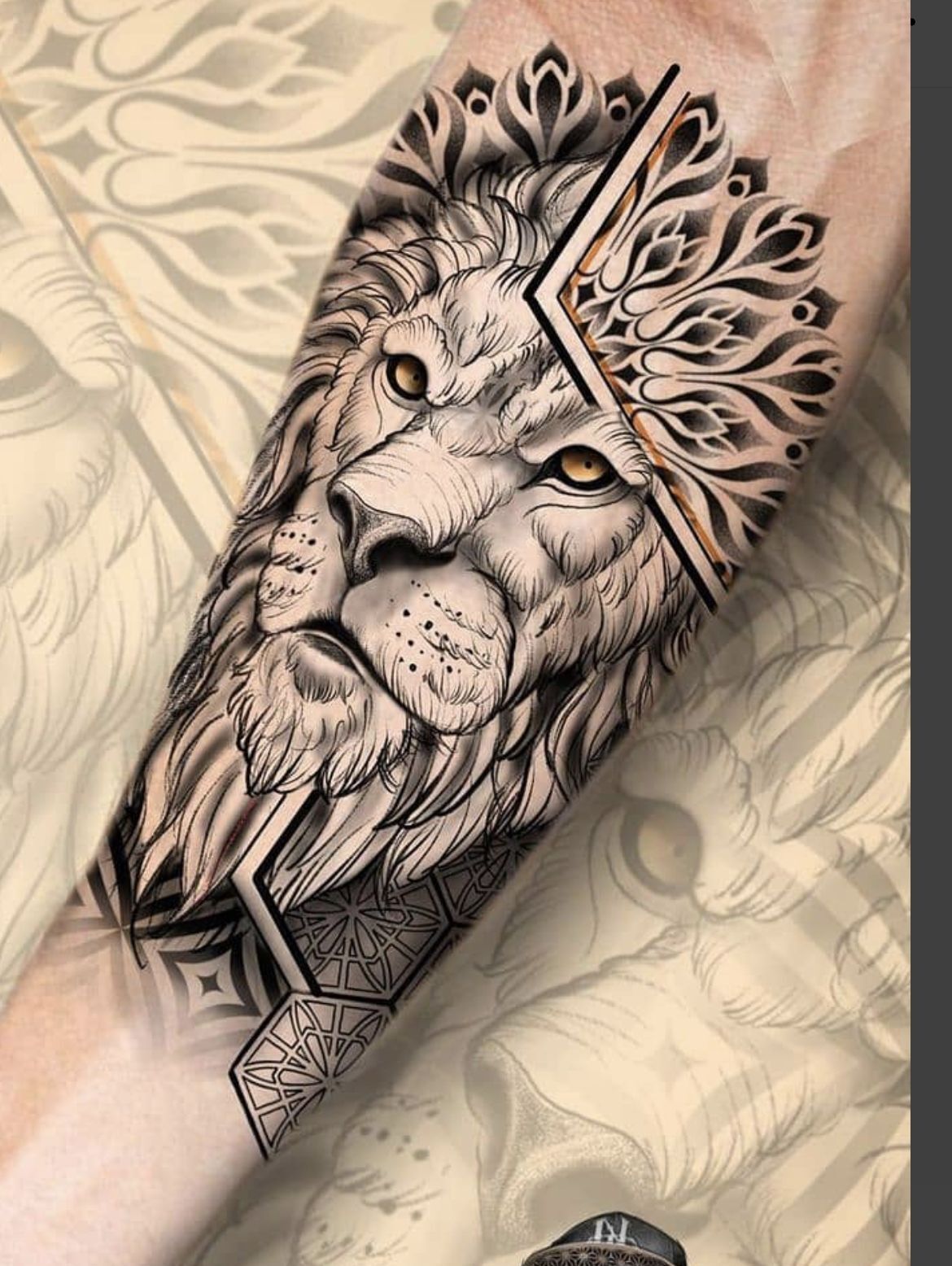Lion tattoos are a popular choice among tattoo enthusiasts. These majestic creatures have been depicted in art and mythology for centuries, and their powerful symbolism resonates with people today. Whether you're looking for a small, discreet design or a bold, statement piece, a lion tattoo can be a meaningful and powerful way to express yourself. This article will explore everything you need to know about lion tattoos, including their symbolism, meanings, and popular design ideas.
Are you only interested in tattoo designs and want to skip the educational part?
No problem, we got you covered! Click HERE to get inspired.
What Does The Lion Symbolize in different cultures?
The symbolism of the lion varies across different cultures. Here are some examples of what the lion represents in various cultural contexts:
Ancient Egypt: In ancient Egypt, the lion was associated with the goddess Sekhmet, who represented power, war, and protection. The lion symbolized both ferocity and guardianship. Lions were also seen as protectors of the pharaoh and were often depicted on thrones and in temple architecture.
Ancient Greece and Rome: In ancient Greek and Roman mythology, the lion was associated with the goddesses Artemis and Diana, who were often depicted with lions. The lion symbolized strength, courage, and hunting prowess. It was also associated with the Greek hero Hercules, who famously fought and killed the Nemean lion as one of his Twelve Labors.
Buddhism: In Buddhism, the lion is considered a symbol of the Buddha's royal lineage. It represents the Buddha's teachings, strength, fearlessness, and the ability to overcome obstacles on the path to enlightenment. The Buddha is often referred to as the "Lion of the Shakyas."
Chinese culture: In Chinese culture, the lion symbolizes power, prosperity, and good luck. Lion dances are performed during festivals and celebrations to bring good fortune and drive away evil spirits. The lion is also associated with the Chinese zodiac as one of the twelve animal signs.
African cultures: In many African cultures, the lion holds significant cultural and spiritual symbolism. It is often regarded as the king of animals and represents strength, bravery, and leadership. In some traditions, the lion is considered a totem animal, representing certain tribes or families.
Christianity: In Christianity, the lion is associated with various symbolic meanings. It is often used to represent Jesus Christ, referred to as the "Lion of Judah," emphasizing his power, majesty, and victory over sin and death. The lion is also a symbol of the Evangelist Saint Mark.
What do lion tattoos mean?
Lion tattoos can have a range of meanings, and the interpretation may vary depending on the individual getting the tattoo and their personal beliefs. Here are some common meanings associated with lion tattoos:
Strength and courage: Lion tattoos often symbolize strength, power, and courage. People may choose a lion tattoo to represent their own inner strength or to serve as a reminder of their ability to overcome challenges.
Leadership and authority: Lions are frequently associated with leadership and authority. A lion tattoo may be chosen by individuals who aspire to be leaders or who already hold positions of power.
Protection and guardianship: Lions are known for their protective nature, and a lion tattoo can symbolize the desire to protect loved ones or represent a personal guardian. It can serve as a talisman or symbol of safety and security.
Confidence and pride: The lion's confident and regal demeanor can be associated with self-confidence and pride. A lion tattoo may be chosen to convey a sense of personal pride, assertiveness, and belief in oneself.
Royalty and nobility: Due to their association with kingship and nobility, lion tattoos can represent a sense of royalty and elegance. They may be chosen to reflect a person's regal qualities or to signify a connection to their heritage.
Spiritual and mythological symbolism: In some cultures, lions hold spiritual or mythological significance. A lion tattoo may be chosen to represent a specific spiritual belief, such as representing deities or celestial beings associated with lions in certain mythologies.
best lion tattoo ideas and their meanings
Here are some of the most popular lion tattoo ideas and their associated meanings:
realistic lion head tattoo
This design is perfect for those looking for a bold and powerful tattoo that showcases the lion's regal features. The lion's head represents strength, courage, and nobility.
lion and lioness couple tattoo
This design is perfect for couples or best friends, representing unity and protection. The lion represents strength and protection, while the lioness represents nurturing and care.
tribal lion tattoo
This design is perfect for those looking for a bold and modern take on the traditional lion tattoo. The tribal elements represent strength, courage, and power.
watercolor lion tattoo
This design is perfect for those looking for a more artistic and abstract take on the traditional lion tattoo. The watercolor elements represent the fluidity and unpredictability of life.
lion and cub tattoo
This design is perfect for those looking for a tattoo representing family and protection. The lion represents strength and protection, while the cub represents innocence and vulnerability.
Geometric Lion tattoo
A geometric lion tattoo combines the image of a lion with geometric patterns or shapes. This modern and artistic approach to a lion tattoo adds a unique touch. The geometric elements can symbolize balance, harmony, and interconnectedness. This tattoo can be chosen to represent a person's appreciation for art and their desire for a visually striking design.
Who should get a lion tattoo?
A lion tattoo can be suitable for a wide range of individuals, as the decision to get a tattoo ultimately depends on personal preference and significance. Here are some potential reasons why someone might choose to get a lion tattoo:
Symbolic meaning: If the symbolism associated with lions resonates with you, a lion tattoo might be a meaningful choice. If you identify with the traits commonly associated with lions, such as strength, courage, leadership, or protection, a lion tattoo can serve as a symbol of those qualities.
Personal connection: If you have a personal connection to lions or specific experiences involving lions, a lion tattoo can serve as a reminder of those connections or memories. For example, if you have visited a wildlife reserve or have had transformative experiences in Africa, a lion tattoo may be a way to commemorate those experiences.
Spiritual or cultural significance: In certain spiritual or cultural traditions, lions hold significant symbolism. If you have a strong connection to a specific culture or religious belief that associates lions with specific qualities or deities, a lion tattoo can serve as an expression of your faith or cultural identity.
Aesthetics and admiration: Lions are visually striking creatures, and some people choose to get lion tattoos simply because they find the imagery beautiful or appealing. If you appreciate the artistic representation of lions and enjoy their majestic appearance, a lion tattoo can be a way to celebrate that aesthetic.
Ultimately, the decision to get a lion tattoo (or any tattoo) is a personal one. It's important to carefully consider the design, symbolism, and potential long-term implications of a tattoo before getting one. Consulting with a professional tattoo artist can also provide guidance and help bring your vision to life.
General Breakdown Of Tattoo Pain Levels On Different Body Parts
Here is a breakdown of the different tattoo pain levels:
- Low: This level of pain is generally described as a mild discomfort or tickling sensation. It is similar to the sensation of getting a light scratch or scrape.
- Moderate: This level of pain is generally described as a moderate discomfort or aching sensation. It is similar to the sensation of getting a deep scratch or scrape or being pinched.
- High: This level of pain is generally described as a strong discomfort or throbbing sensation. It is similar to the sensation of getting a burn or being stung by a bee.
It's important to note that pain tolerance is highly individual and can vary greatly from person to person. Some people may find certain body parts more or less painful than others, and the same body part can be more or less painful for different people. Additionally, the level of pain can be affected by factors such as the size and location of the tattoo, the skill of the tattoo artist, and the individual's own pain threshold.
Tattoo placement pain level chart
Body Part | Pain Level | Explanation |
Forehead | Low | The forehead has few nerve endings, so it is not a particularly painful area. |
Eyebrows | Low | The eyebrows have few nerve endings, so the pain level is relatively low. |
Ear | Low | The ear is a relatively thin and fleshy area, so the pain level is low. |
Nostril | Low | The nostril is a small area with thin skin, so the pain level is low. |
Lip | Low to Moderate | The lip has more nerve endings than some other areas, so it may be slightly more painful. |
Cheek | Low to Moderate | The cheek has a moderate amount of nerve endings, so it may be slightly more painful. |
Moderate | The neck has a moderate amount of nerve endings, so it may be slightly more painful. | |
Moderate to High | The chest has a high concentration of nerve endings, so it can be quite painful. | |
Abdomen | High | The abdomen has a high concentration of nerve endings, so it can be quite painful. |
Back | High | The back has a high concentration of nerve endings, so it can be quite painful. |
Shoulders | High | The shoulders have a high concentration of nerve endings, so they can be quite painful. |
Upper Arms | Moderate to High | The upper arms have a moderate to high concentration of nerve endings, so they can be somewhat painful. |
Elbows | High | The elbows have a high concentration of nerve endings, so they can be quite painful. |
Forearms | Moderate | The forearms have a moderate concentration of nerve endings, so they are not as painful as some other areas. |
Hands | High | The hands have a high concentration of nerve endings, so they can be quite painful. |
Lower Arms | Low to Moderate | The lower arms have a lower concentration of nerve endings, so they are not as painful as some other areas. |
Wrists | Low | The wrists have a low concentration of nerve endings, so they are not very painful. |
Lower Back | High | The lower back has a high concentration of nerve endings, so it can be quite painful. |
Buttocks | High | The buttocks have a high concentration of nerve endings, so they can be quite painful. |
Thighs | High | The thighs have a high concentration of nerve endings, so they can be quite painful. |
Knees | High | The knees have a high concentration of nerve endings, so they can be quite painful. |
Calves | Low to Moderate | The calves have a low to moderate concentration of nerve endings, so they are not as painful as some other areas. |
Ankles | Low | The ankles have a low concentration of nerve endings, so they are not very painful. |
Tattoo aftercare tips
Before getting a tattoo:
Choose a reputable tattoo artist and parlor. Research the artist's portfolio and read reviews from previous clients.
Consult with the artist about the design and placement of the tattoo.
Make sure you are in good health. If you have any medical conditions or are taking any medications that may affect your ability to heal, be sure to let your tattoo artist know.
Consider using a numbing cream to reduce pain during the tattooing process. These creams contain a numbing agent (such as lidocaine) that can be applied to the skin before the tattoo is done. It's important to follow the instructions on the numbing cream and to only use it as directed.
Avoid alcohol, caffeine, and other substances that can thin your blood for at least 24 hours before getting a tattoo.
Eat a healthy meal before your tattoo session to ensure that your blood sugar is stable.
Wear loose, comfortable clothing that allows easy access to the area being tattooed.
After getting a tattoo:
Follow the aftercare instructions provided by your tattoo artist. These may include:
Keeping the tattoo clean and covered with a bandage for the first few hours after getting tattooed.
Washing the tattoo with lukewarm water and a mild soap (such as unscented, antimicrobial soap) and patting it dry with a clean towel.
Applying a thin layer of tattoo ointment or lotion (such as A&D or Aquaphor) to the tattoo and covering it with a clean bandage or wrap.
Repeating this process for the first few days, or until the tattoo has fully scabbed over.
Avoid soaking the tattoo in water for the first week, such as in a bath or pool.
Avoid picking or scratching at the scabs, as this can cause the tattoo to fade or become infected.
Avoid exposure to direct sunlight or tanning beds for at least 2-4 weeks.
If you experience any redness, swelling, or unusual discharge, contact your tattoo artist or a healthcare professional.
Overall, it's important to keep your tattoo clean and moisturized during the healing process to ensure that it heals properly and looks its best. Using a numbing cream can help reduce pain during the tattooing process, but it's important to use it as directed and to follow all aftercare instructions to ensure that your tattoo heals properly.
People Also Ask:
What Are The Most Popular Lion Tattoo Designs?
Some of the most popular lion tattoo designs include realistic lion head tattoos, lion and lioness couple tattoos, tribal lion tattoos, watercolor lion tattoos, and lion and cub tattoos.
Is A Lion Tattoo Suitable For Both Men And Women?
Yes, lion tattoos can be suitable for both men and women. The symbolism and meanings behind lion tattoos can be relevant to both genders.
What Should I Consider Before Getting A Lion Tattoo?
Before getting a lion tattoo, consider the size and placement of the tattoo, the design and symbolism most meaningful to you, and research and choose a reputable tattoo artist who has experience with lion tattoos.
Can A Lion Tattoo Be Inked In Color Or Just Black?
Lion tattoos can be inked in both color and black. A black and white lion tattoo can have a classic and timeless look, while a color lion tattoo can be more vibrant and eye-catching.
What Are The Best Places To Get A Lion Tattoo?
Some popular places to get a lion tattoo include the upper arm, chest, back, and thigh. However, the best place to get a lion tattoo is one that is meaningful to you and also suits your lifestyle.
Is There Any Special Symbolism Behind Lioness Tattoos?
Lioness tattoos often symbolize femininity, motherhood, independence, and the nurturing qualities associated with lionesses. They can be chosen to represent strength, resilience, and a connection to powerful female figures.
Can Lion Tattoos Be Combined with Other Elements or Symbols?
Yes, lion tattoos can be combined with other elements or symbols to enhance their meaning. For example, incorporating a crown can emphasize the lion's regal qualities, while adding flowers or a compass can symbolize beauty or guidance, respectively.
What Are Some Small Lion Tattoo Ideas?
Small lion tattoo ideas include minimalist lion outlines, small lion heads, or paw prints. These designs are often chosen for their simplicity and subtlety, and they can be placed on various body parts such as the wrist, ankle, or behind the ear.
Are Lion Tattoos Painful to Get?
The pain experienced during a tattoo session can vary depending on individual pain tolerance and the location of the tattoo. Generally, lion tattoos on fleshy areas like the upper arm or thigh are considered less painful compared to areas with less muscle and more nerve endings.
Can Lion Tattoos Be Cover-Up Tattoos?
Yes, lion tattoos can be used as cover-up tattoos depending on the design and size of the existing tattoo. Skilled tattoo artists can work with you to create a lion tattoo that effectively covers up the previous tattoo while incorporating the desired symbolism and aesthetics.
Watch A video of a lion tattoo done by a pro
185+ lion tattoo Ideas For Your Inspiration
Final thoughts:
Lion tattoos are a popular and meaningful choice for those who appreciate the lion's powerful symbolism and majestic beauty. With their many different meanings and design options, lion tattoos can be a great way to express yourself and connect with your inner strength and courage. Whether you're looking for a small, discreet design or a bold, statement piece, a lion tattoo can be a powerful and meaningful way to decorate your body.

